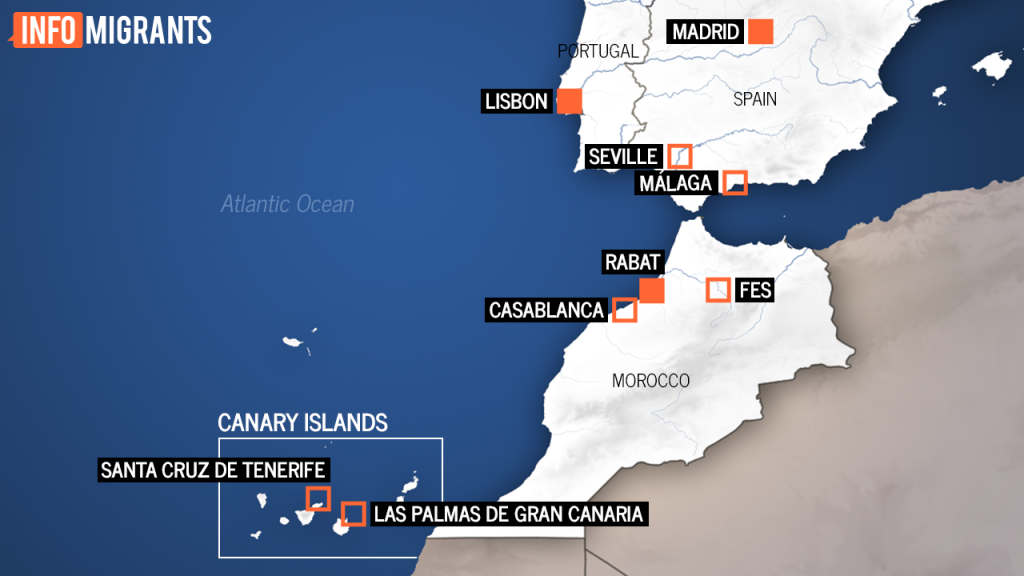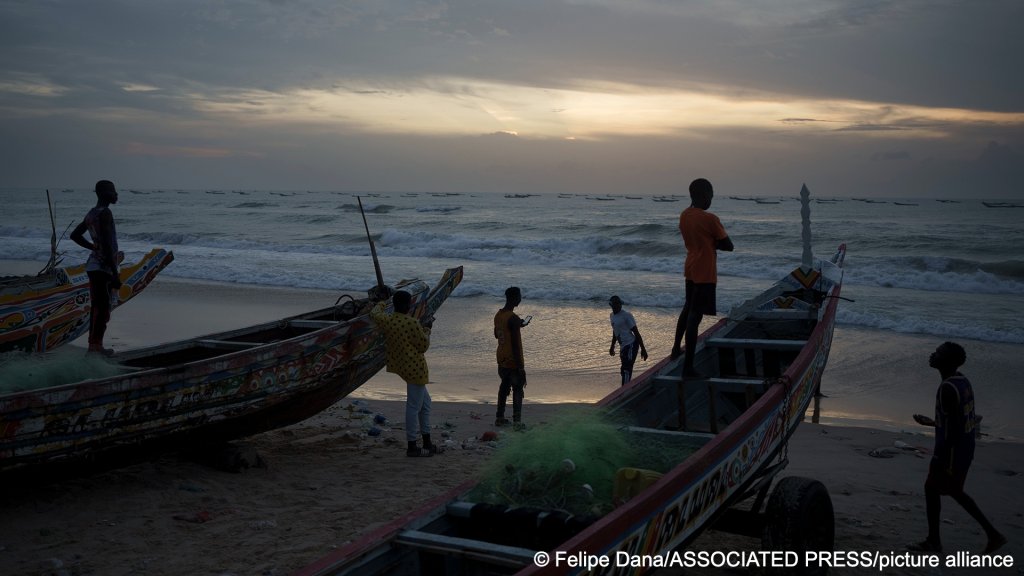A report by the Environmental Justice Foundation claims that unregulated and illegal overfishing by Chinese and European boats has emptied Senegal's waters of fish. This, in addition to family and social pressures is helping to fuel irregular migration to Europe. In 2023, most of the 30,000 people who made their way to Spain by boat were from Senegal.
A stretch of about 1,500 kilometers of sea separates Abdou, 26, from his family. If the ocean back home in Senegal were not emptied of fish, this distance would not exist.
Abdou left Joal-Fadiouth, a fishing town in Senegal, in November 2020. He spent about 14 days on a rickety wooden fishing boat before reaching Tenerife, a Spanish island off the coast of Morocco. He was lucky to have lived through the journey.
"There were people on the boat who had the same dream and purpose as me, but they never arrived. They died at sea. May their souls rest in paradise," said Abdou.
Unregulated and illegal overfishing by European and Chinese vessels has emptied Senegal's waters of fish, deepening poverty and food insecurity, claims a new report by the Environmental Justice Foundation. Coastlines that once sustained families with food and livelihoods have instead become launch pads for young Senegalese men like Abdou to make a perilous journey to Europe.
Abdou tells his story in "Adrift", a documentary by the Environmental Justice Foundation (EJF), an international NGO working to defend our shared natural environment and human rights:
Multiplying departures
Abdou's father, Sada, has been fishing since 1985. The waves of the ocean run deep in his family, from his siblings to his cousins, down to his extended relatives. All of them have worked in Senegal’s artisanal fishing sector.
"The sea is my only hope to provide for my family," Sada said in the documentary, speaking from Senegal.
Sada still remembers a time when the sea could provide everything he and his family needed. When the sea was abundant, young men could stay in Senegal. They could earn enough to support their family's needs. Now, young men like his son appear to be leaving in droves, sailing for Europe, primarily the Canary Islands in Spain.
A conflation of factors that include the expansion of largely foreign-owned fishing vessels from Europe and China is colliding with global heating and poor management of the fisheries sector, and decimating fish populations and economic prospects of coastal communities like Joal, in the process, notes the EJF in their report.
With few options left, hundreds of young Senegalese men have set sail for Europe, primarily Spain, in search of opportunities that no longer exist at home.
Read Also Canary Islands: Deaths, arrivals and the ongoing debates over redistributing young migrants

In 2023, most of the 30,000 people who made their way to Spain by boat were from Senegal. The following year, Spanish authorities estimated another record number of 46,843 people arrived in the Canary Islands. In the same year, the Spanish NGO, Caminado Frontreras, counted more than 10,000 people who they estimate died making the journey.
This escalating, intersecting crisis demands urgent attention and action. China, the EU and other foreign states must take responsibility and work alongside the Senegalese government to ensure sustainable, ethical and legal fisheries before more lives and more livelihoods are lost, states the EJF in its report.
Read AlsoSpain seeks to stem migration with vocational training in West Africa
Illegal, unreported, and unregulated
EJF's report "The Deadly Route to Europe" details how overfishing and what they term illegal, unreported and unregulated (IUU) fishing in Senegal are driving the collapse of the fisheries industry, and with it, irregular migration to Europe.
According to the related EJF report, "The Sea Was Sold", Senegal’s fishing sector supports about three percent of the country's workforce and provides nearly eight percent of the population’s protein. However, coastal communities and artisanal fishers are threatened by destructive practices like bottom trawling, compounded by overfishing and what the EJF claim are illegal operations by some European and Chinese fishing vessels. Claims of illegality are regularly denied by the fishing companies operating in the region.
However, according to environmentalists, these fleets are reported to be shielded, often by opaque agreements that allow them to export most of their catch to the EU and China, depriving local populations of both food and livelihood.
Read AlsoRecord number of migrant deaths in 2024 as Atlantic crossings to Spain soar
EU response
In 2024, after pressure, the Senegalese government agreed to publish a list of fishing companies that were authorized to operate in their waters. The publication of the list was designed to cut down on IUU fishing. A practice that the private advocacy organization Global Fishing Watch said at the time was "rampant" in West African waters. In May 2024, GFW claimed that 40 percent of the fish caught in this region was via IUU practices.
However, in November 2024, the EU said that their fisheries agreement with Senegal could not be renewed until Senegal made "sufficient progress" against IUU practices. The EU has said it has a zero tolerance policy towards IUU and in May 2024 identified Senegal as a "non-cooperating country in the fight against IUU fishing."
The press release from the EU at that time made clear that in the period 2019-2024, the EU had contributed 8.5 million euros to the state budget of Senegal as part of the fishing protocol.The money was meant to help develop the fisheries sector and for its governance.
Over that five-year period, the catches made by EU fleets represented "less than one percent of the total catches declared," stated the EU press release. " These catches, targeting only tuna and black hake, were made in Senegalese waters beyond 12 nautical miles from the coast, thus avoiding interference with the activities of Senegalese artisanal fishing."

'Far-reaching consequences'
For many Senegalese, especially who were born into the fishing communities, migration has become a last resort—a desperate response to dwindling opportunities and a collapsing marine ecosystem.
"This critical sector, which forms the socio-economic backbone of Senegal’s coastal communities, is in crisis. Small-scale fishers face overwhelming competition from industrial vessels, leading to deteriorating living conditions, diminished food security, and lost livelihoods. The consequences are far-reaching, contributing to a troubling increase in migrant deaths at sea. The European authorities can and must end this now, and return Senegal’s fisheries to the people of Senegal," Steve Trent, CEO and Founder of the Environmental Justice Foundation, said in a statement.
Others have slammed what they call "the boat race to the Canary Islands."
"I get so angry when [foreign nations] complain about immigration because they are the real pirates and what they did is worse than clandestine immigration. We are risking our life to go, but they come here to steal our fish. It’s theft - plundering our resources to feed their own inhabitants while we suffer," said Karim Sall, President of AGIRE, a Senegalese organization operating in the Joal-Fadiouth marine protected area. Agire means to act in French.
Meanwhile, from the place he calls home in Tenerife, Abdou thinks of all he has left behind in Senegal. "I long for Joal's harbor and to go fishing with my family," he says on film.
